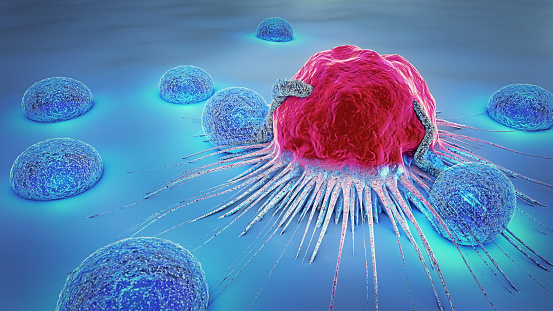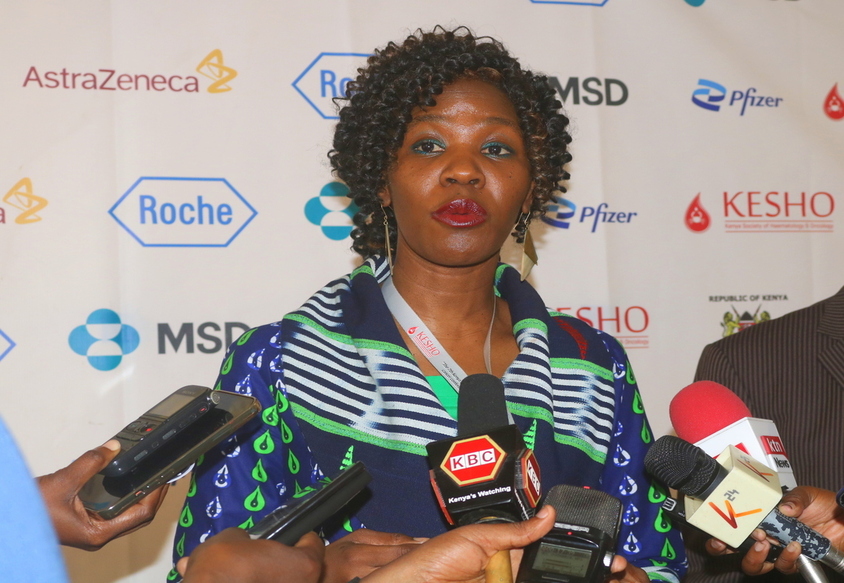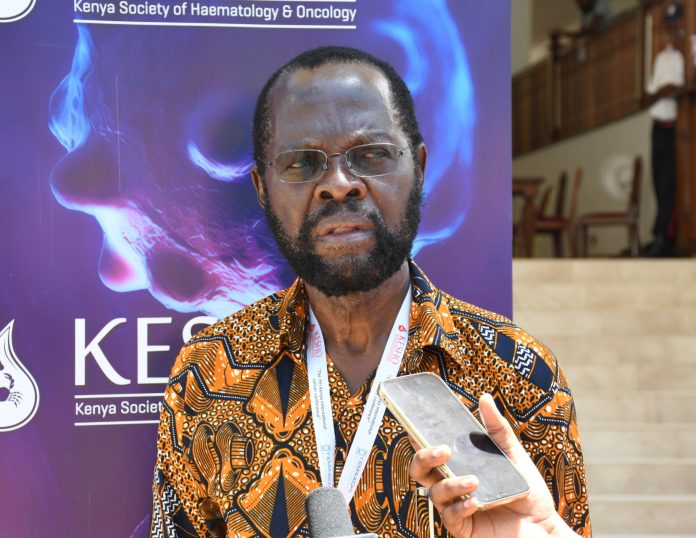
a cancer cell and lymphocytes
African governments must invest funding in cancer research, awareness, prevention and treatment to curb the rising numbers of cases, resulting in a massive loss of lives. This was a clarion call during the 7th Kenya International Cancer Conference that brought together haematologists, oncologists at Kenya’s seaside city of Mombasa for the three-day event from 24 to 26 November.
While addressing the conference, chairperson of the Kenya Society of Haematology and Oncology Dr. Miriam Mutebi said that the Kenyan government for instance should set aside nearly Kshs. 12 billion (0.1% of Kenya’s GDP) annually to finance targeted research on cancer, to inform the local interventions in the fight against the disease.

Additionally she submitted that research is a key pillar in matters of cancer control and of extreme significance in understanding the cancer burden and how patients respond to different treatments and interventions.
She mentioned that a lot of the cancer research being conducted in the East African country was not addressing challenges faced by Kenya.
“This is because cancer research is largely funded through external collaborators who frequently dictate the terms and areas of the research, which may not always align with the local priorities,” Dr Mutebi explained.
Dr. Gebrekrstos Hagos, a Clinical Oncologist at Needle Cancer Care Center in Hargeisa said that education on the signs and symptoms of cancer is key, coupled with increasing the capacity of health workers on early detection and referral to cancer centres.
Dr Hagos who did a study in Hargeisa said most patients admitted to oncology wards were at advanced stages of cancer, and this can be due to late presentation or long waiting time for cancer treatment.
Dr. Hagos submitted that: “The proportion of cases in developing countries will increase from 56% in 2008 to more than 60% in 2030.”
Dr. Verna Verndapuye from National Center for Radiotherapy Oncology and Nuclear Medicine Korle Bu Teaching Hospital in Accra Ghana said that adoption of Universal Health Coverage globally will help in cancer management. She added that regional cancer centers of excellence as well as increased technological skills will go along way in the fight against the disease.
On his part, Kisumu Governor Prof. Anyang Nyong’o said funding health services must be prioritized in county governments.

Prof. Nyong’o challenged medical care givers, oncology experts and supportive staff to push the agenda for increased finances to primary healthcare and preventive initiatives both at the county and national government levels.
“The cancer figures at the county level are so huge when compared to the meager resources allocated for attending to them. In fact, infrastructure and human resources are the key challenges faced by counties in their fight against cancer,” the Kisumu County Governor said. “Given the projection of cancer numbers, we should all support counties in putting in place infrastructure for cancer screening and other early detection measures.”
He also challenged stakeholders to change their approach to cancer screening to places where the targeted are. “If you are targeting men, for instance, why can’t you do such things [cancer screening] in bars and football pitches?,” he posed.
The Conference chairperson reminded delegates at the meeting that African Union member states in 2012 adopted a proposal to dedicate at least 1% of their respective GDPs for health research, adding that Kenya should move a step further by ring-fencing at least 10% of that amount for cancer research.
According to data from Globocan, the aggregate cancer burden in Africa showed 1.1 million new cases and 711,429 deaths were estimated to have occurred on the continent in 2020.
Breast cancer was the leading malignancy in females in Africa, with nearly 186,598 new cases and 85,787 deaths in 2020. Cervix uteri (cervical cancer, henceforth) was ranked second in Africa with an estimated incidence of 117,316. Prostate cancer was the leading cancer in African males with 93,173 cases and 47,249 deaths.

